Play Like A Girl
Talented women across the sports world have been breaking down systemic barriers as they join—and succeed in—the men’s leagues. However, their experiences bring to light two concerning phenomenons. These women were often promoted because they were considered too good for the female leagues, implying that as whole, female leagues are inferior to their male counterparts. Even more concerning, perhaps, is the fact that each of these women credited the men around them for their success, when in reality, it was their own drive, talent, and grit that got them to where they are today.
April 10, 2020
If you were to look down at the field during Super Bowl LIV, you would see a sea of men. But standing in front of the mass of red and gold with the Niners logo proudly on display and intently focused on the field is Katie Sowers. Sowers in the first openly gay and first female coach in Super Bowl history.
Sowers is a first, and she shares this distinction with a handful of women in the world of male professional sports. Know their names:
Katie Sowers, 49ers offensive assistant coach.
Jennifer King, Redskins offensive assistant coach.
Alyssa Nakken, SF Giants assistant coach.
Justine Siegal, Oakland A’s temporary coach.
Sarah Thomas, NFL referee.
And Palo Alto’s very own, Terri Valenti, NFL replay official.
Unlike most referees who start in college as former athletes, Valenti’s NFL track is arguably her fourth career.
She began her adult life with an engineering degree from the University of Florida and went into the US Navy as a civilian electronics engineer. There she met her husband, settled down, and had her first few kids. After years of following him while his Navy job took him around the country, they settled down in the sunny Bay Area. She left her second career, stay-at-home mom, and went back to school for her Masters in engineering from Stanford University.
The family then moved to Ohio, where Valenti taught at Kent State University until they moved back to the Bay. Determined to set down firmer roots, she became a professor at Menlo College and focused on her family.
At this point in her life, all of her five sons were playing football. The younger few played in youth football leagues, while her oldest started out on the Paly school team.
When a desperate call came out to players’ parents, pleading them to sign up as officials, she thought about her love for football and decided to dive right in.
“I kind of just signed up, back in 1999,” Valenti said. “I said, ‘Well, yeah, I’ll try it.’ I think it was because I had boys, I’d been around guys with the engineering world.”
Valenti’s love for the trade was immediate. She took to it like a fish in water; the physicality of running up and down the field appealed to her inner track star, the communication between officials brought out the people-person within her, and the mental aspect, the rules know-how, the judgement, the expertise, all spoke to her analytical engineering background.
“It was so much fun, it tapped into a lot of my personality: I had to study the rules and I love learning, and love the choreography of it,” Valenti said.
Valenti was part of a handful of female officials dotted across the country. The problem was that none of them were advancing. Unlike male referees who started in youth or high school leagues and then moved up through the ranks to college or professional football, the women often remained in the same position for years. Valenti recalls female officials that she met in Arizona who, after ten years of experience and enough talent to move up, were still stuck at the JV level.
Valenti was determined to not get stuck in the same trap as she had found her niche in officiating.
“I remember the president of the association coming out to my car saying goodbye, and talking about my first year,” Valenti said. “I told him literally through the car window, I said, “I love this. I had so much fun. I want to go as far as I can. I want to get to the NFL.”
Not everyone loved the idea of her continuing refereeing. The biggest obstacle was presented in the coaches and administrators who resented the change in status quo.
“My very first high school game at the varsity level, the coach came out to the lead official, who’s called the referee and wears the white hat, and said ‘What’s she doing out here? I don’t want her on my game,’” Valenti said.
Coaches were not the only obstacle that she faced. Valenti recalls many times where she was promoted and figured that it was the highest level of competition she would reach. Leagues were not sure if they were ready for her.
The UFL, the United Football League, hired Valenti in 2009, but Valenti even faced challenges after being hired. After they hired her, the UFL backtracked on their decision.
“They weren’t ready for a woman yet. And so they literally said, ‘Sorry, but we’ve changed our minds,’” Valenti said. “About two or three weeks later, they came back and said, ‘Nope, you’re back on. We really want to do this, we want you to be on our roster, we want you on the field for the United Football League.’”
Nevertheless, she persisted.
“I really wasn’t out to set any kind of mark,” Valenti said. “I had no agenda. I just kept challenging myself with the next level or the next step or the next game.”
And that she did. She had skipped the college track, a decision that she defines as the hardest and best professional choice she has ever made, and moved to the indoor professional game, the Arena Football League.
Officiating in the UFL gave her the credibility to continue smashing barriers in other areas, and eventually, she was hired by the NFL.
Despite the obstacles she faced in getting there, she found support in the team surrounding her.
“The officials that you work with, all they care about is having a partner with them on the field, in the trenches that can do the job,” Valenti said. “They might have their personal preferences or their personal opinion later, but I really had no trouble for the most part. It’s just breaking that barrier to get in.”
Now that this barrier has been broken, Valenti seeks to keep pushing the limits. She has her sights set on being the first female to officiate a Super Bowl.
In great part, she credits her success to her mentor, Carn Paganelli, a retired official.
“I think I would not have been as successful without my mentor,” Valenti said. “Everyone needs a mentor. In every profession, to become a really good writer or engineer or career person or a CEO of a company, you need mentors to help guide you through the obstacles and the paths.”
Because of these experiences, she craves the ability to help other women succeed, in the way that Paganelli did with her.
“I want other females to know that anything they want to do, you have to have a passion for, you can do it,” Valenti said. “I felt that same way as an engineer. I remember I started in the early 80s in a calculus class of four women, maybe, and 500 men. There were no engineer females either back then so I’m not new to this kind of dynamic.”
Valenti sets an incredible example for other women, paving the way to a career in professional male sports leagues. Even on a smaller scale, women have been doing that for ages.
In high school and even younger, women are proving their skills among the boys, showing that the gender gap is fiction and not fact.
Lindsey Ball (‘21) and Emma Leschly (‘21) are two such unique players.
Both extremely athletically motivated, they have been playing sports their whole lives. When you look at them now, you will see an accomplished soccer and tennis player, respectively. Four years ago, you would have seen the only two girls on Menlo School’s boys flag football team.
For Ball, her football career began during elementary school lunches, where she played with the boys. Leschly’s athletic passions were incredibly broad. At the time, she played soccer and rode horses, but she herself will tell you, “I’ve tried pretty much every sport and had a blast playing all of them.”
Having watched their brothers play competitive sports all their lives, they wanted to join in on the fun.
“I have an older brother who I always wanted to be better than, so that was definitely a huge factor in motivating me to get better at sports,” Leschly said.
When seventh grade rolled around, the girls wanted something new- they decided to try their hand in football. However, in looking for a team to join, they were confronted by an obstacle: there was no girls flag football team.
Without hesitation, they signed up for the boys team.
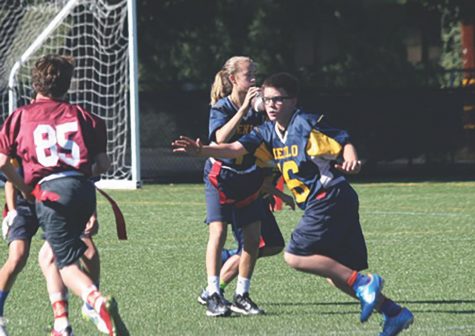
It was a bit of a rocky start. Leschly could throw and catch a football relatively well, but beyond that her football abilities were extremely limited.
“I didn’t know any of the rules except what a touchdown was and that the quarterback was the dude who threw the ball,” Leschly said.
Being on the boys team was isolating—both girls felt like outcasts as the season ramped up. They weren’t welcome.
Leschly and Ball were treated like they were completely radical.
“There was no explicit rule saying that girls weren’t allowed to play, but it always felt like this rigid unwritten rule,” Leschly said. “When we started playing, a lot of people thought it was really weird and people judged us for it, so I definitely questioned my choice to join the team a lot.”
Despite their growing abilities, the boys neglected to include Ball and Leschly. On every play, the ball flew into the hands of a boy, and the girls were grudgingly picked last for teams.
“A lot of the guys on the team were annoyed with me because they thought I ‘slowed the team down,’” Leschly said.
This didn’t stop Ball and Leschly; instead, it motivated them. Growing up, the girls had learned from their brothers not to back down—it didn’t matter that they were up against boys.
They worked hard at practice, continually improving their skills. Playing with boys offered a challenge that they didn’t feel in their other sports: an increased level of physicality.
“Once I started playing more and more, I would never shy away from playing because that isn’t what my brothers taught me,” Ball said.
They didn’t just face resistance from their teammates. Leschly recounts how other teams would single them out to make fun of them. Adding to the already-tense relationship between Leschly, Ball, and their male team, the girls were constantly berated by their competitors. There were even instances of other teams approaching the boys and making fun of them as well.
One competitor actually walked up to a teammate of theirs during a game, telling him that the team wasn’t good because of the fact that it had two girls playing for it. His perspective was far from the truth—Leschly and Ball’s team was superior and they proved it by easily winning the game.
Working hard to prove they were deserving of their spots on the team, Leschly and Ball improved dramatically. They honed their skills and began to earn the respect of their peers. On defense, the dynamic duo was a force to be reckoned with. The girls had the strength and speed to compete with the boys, and sometimes the opposing players would neglect to defend them on the grounds that they were girls.
It didn’t bother the girls that they were playing with all guys; what bothered them was the fact that the boys assumed they couldn’t play because they were girls.
Long before they earned the respect of their team, though, they proved their abilities to each other. Even years later, they speak very highly of each other’s skills. Leschly shines with pride over Ball’s potential: “Lindsey is a fantastic player; on offense she played starting quarterback and could launch a perfect spiral farther than most of the boys.”
When their eighth grade season came to a close, so did this adventure. Without a high school flag football team to join, they moved on to other sports.
Many years and many seasons of women’s sports later, Ball and Leschly reflect on the similarities between playing with girls and playing with guys.
“When it comes down to it, we are all playing the same sport,” Ball said.
Annikah Shah (‘21), on the other hand, disagrees, referring to more nuanced differences between the two.
She notes that throughout her experiences, the girls teams provided a much more social atmosphere and emphasized the importance of a cohesive team, whereas the boys focused solely on the game in front of them, setting aside anything that did not directly relate.
She began playing on boys teams at a younger age than Leschly and Ball—and she plays basketball, not football—but her experience shares a notable characteristic. Shah’s love, and talent, for basketball was born out of casual games in the park with her brother and father.
In third grade, she was trying out competitive girls club teams when her significant talent caught the attention of the boys’ coaches. Interested in her developing skills, they put her on the boys team.
For six years, Shah played with the boys. As the years progressed, the boys kept growing taller and stronger. She stayed at her mere 5’3” stature, but never considered her height a cause for backing down. Learning to play with people bigger than her was a necessary step for her successful transition into higher levels of play.
“It got harder and harder to play with the boys just because they were getting taller and stronger,” Shah said. “It helped me get ready for the girls game, for high school or middle school ball—I was faster and stronger when taking hits during games, because of the boys.”
Unlike Leschly and Ball who often faced guys unwilling to face-off against them, Shah had her hands full with boys ready to challenge her. They didn’t take it easy on her, playing just as aggressively against her as they would against anyone else.
“That actually made it harder for me because they’re getting stronger and older, but throughout playing with the boys, it was always the same,” Shah said.
Shah’s experiences provide an interesting narrative: she was moved up to the boys league because of her exceptional talent. Whether her coaches meant to suggest it or not, it’s a move implying that the girls league, and the girls playing in it, are inherently less talented than their male counterparts.
Talia Grossman’s story seems to verify this societal mentality. Now a graduating member of Menlo School’s 2020 class and a USC soccer commit, Grossman has tried almost every sport imaginable.
At age five, she was a soccer, softball, and basketball player. By age ten, she was involved in baseball, tennis, fencing, kung fu, and judo. This athletic drive was inspired by her family: her parents, who are big sports fans, and her older brother.
Grossman’s brother had a particularly strong influence on her athletic career. Even separated by distance and a six-year age gap, she regards him as her biggest fan.
Three years into her softball career, when she was eight, Grossman was so talented that she was placed with 13-year-old girls to match her skill level. Unhappy with the unwelcoming older girls, she sought an alternative solution.
Her mom suggested that she try baseball instead of softball – her unique proposition stemmed from Grossman’s own family history. When Grossman’s dad was 11 years old, he played in the Palo Alto Little League and two of the best players in the league were girls. Grossman decided to switch to baseball and try out for Little League. Immediately after the tryout, she was selected for the Majors, the last step in Little League, and played for Morgan Gault Homes. From that moment on, Grossman was a baseball player rather than a softball player. After Little League, she continued her baseball career by playing in the Babe Ruth league for the Palo Alto Oaks and even played for a couple of travel ball teams.
“I’ve never let tradition or rules prevent me from trying something new,” Grossman said.
While Grossman excelled in boys baseball, her biggest accomplishments in baseball came from playing on women’s baseball teams. Grossman played on two all-girl national baseball teams and competed against many of the top all-boy baseball travel teams in the country. They even faced off in Cooperstown, New York, home of the baseball Hall of Fame.
Even though she didn’t know her teammates well at first, they bonded over their similar experience—the isolation of being the only girl on an all-male team.
“We all knew exactly what it felt like to be the only girl in a boy’s league,” Grossman said. “When you’re the only girl on a boys team, it’s a lonely experience and also stressful because you’re always being scrutinized.”
This high-level scrutiny was accompanied by an equally-stressful amount of criticism. In her first year of Babe Ruth, Grossman remembers a shocking incident in which, during the middle of an inning, the opposing coach stopped the game to give her a lesson in proper pitching. He walked out from the dugout and began announcing her technical errors to the entire field.
“Then he called out into the stands, asked who my mother was, and commanded her to get me some pitching lessons,” Grossman said. “[It] was humiliating and mortifying—and, frankly, disgusting. To this day, I get incredibly triggered just thinking about it.”
The barriers she faced became the basis for her activism.
“[Baseball] opened my eyes at a young age to how the real world works, [and taught me] that sexism is incredibly pervasive,” Grossman said. “Wherever I’ve played I’ve always been underestimated and I’ve had to prove that I belong.”
Playing baseball in boys leagues gave Grossman a jumping-off point in other sports. When she decided to try out for flag football in the sixth grade, the only team available was the boys team. Her school did not want to let her play because she was a girl, but her parents stood up for their daughter and Grossman was given a spot on the roster.
Grossman was not intimidated by the boys because of her experience playing on boys teams. By then she was used to playing sports with the guys and wasn’t intimidated by the challenge: she wanted to learn to play football.
“I knew for a fact I could hold my own with the guys,” Grossman said. “It was just a matter of memorizing the plays and learning to block.”
While she enjoyed football, it was clear to Grossman that her true passion was in baseball and soccer—she wanted to play in college. Much to her chagrin, at 13, she realized this was an impossible goal: none of the colleges she wanted to attend offered an opportunity for her to play baseball, and she didn’t like softball enough to switch to that.
With no baseball future in sight, she decided to return to soccer and learn how to be a goalkeeper.
In retrospect, the moments that Grossman cherishes, from both baseball and flag football, were the moments that she would blend in with the crowd.
“Not as a girl. Not as a special member of the team. But like just another player,” Grossman said. “The best moments for me were when gender was irrelevant and all that mattered was your talent and your heart.”
A common thread connects these stories. The boys leagues are the big leagues, and each of these girls who broke barriers were encouraged, supported and mentored by men.
Both Shah and Grossman were so impressive to their coaches that they were deemed “too good” for the girls leagues and moved up to boys. Why were the boys seen as so much better? Why was it a privilege for the girls to be considered talented enough for the move?
Each of these girls, incredibly talented, fiercely passionate, and strongly devoted to their sports were there by their own right. Yet even so, they each cite their brothers and fathers as the instigators behind them breaking barriers and challenging stereotypes.
Even the girls who have the talent, the drive, and the thick skin to play in the boys leagues don’t stay for long. Ball, Leschly, and Shah all left the boys teams they played for by high school at the latest. Grossman stayed longer, but with the understanding that the end was soon approaching.
Paly has its own challenger to this gender status quo—Sydney Japic (‘22).
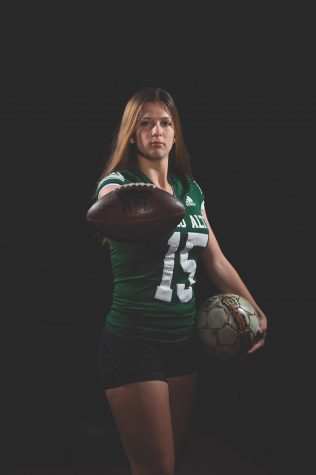
A soccer player by trade, Japic turned her sights towards kicker when Patrick Crowley (‘21), Japic’s friend and member of Paly’s varsity football team, saw her in the weight room and told her to try out.
Initially, she flat out refused, but the longer she mulled it over, the more appealing the idea became.
“I have always thought that if I was a guy in high school I would play football 100 percent, and I think that is an experience that you can never get back,” Japic said. “Playing out on that field, having your entire school watch you. I think that’s something I would always want.”
Given the chance to do something she always wanted, she dove in headfirst.
“When the opportunity came, I thought, ‘Why not? There’s nothing to lose.’”
Her role model for this decision is a girl she has never even met: Laila Thompson-Wainer, a senior at Menlo Atherton High School and the only female on the football team. Hearing her story piqued Japic’s interest.
Japic decided to take a chance. To try out, at least.
“I kind of want to be the first,” Japic said. “I want to change things.”
As excited as Japic is, though, about the possibility of kicking for Paly in the upcoming season, she understands the magnitude of her decision.
Her main concern is not her ability to play, it’s the reactions of those around her.
“There are a lot of judgmental people,” Japic said. “If you mess up in soccer you can run back and defend, but as a kicker you have one try. I feel like I would have to work ten times harder than anyone else to be seen as being as good and able to compete with the team.”
Thankfully, she can count on the support from her friends on the football team. Having spoken with several of them, she feels that it would be an odd, albeit welcoming experience, and isn’t worried about their attitudes.
“Having the support of other people helped me gain confidence in myself,” Japic said.
Japic worries about the isolation of being the only girl, the stress of being the female ambassador. Instead of getting hyped in the locker room with the rest of the team, she would be changing alone, separate from everyone else. She worries that if she misses a kick, someone will say that it’s because she is a girl, writing her off simply because of her gender.
But if she misses a kick she won’t be ashamed.
“‘Oh, the girl missed,’” Japic said, mocking the response she might expect from the crowd. “Yeah, the girl who made it on the team instead of every other boy who tried out for kicker and didn’t make it because I beat them. Because I was better than them.”
At the end of the day, if Japic walks on the field in full pads next season, it will be to play football as the boy’s equal, not as an ambassador for women in sports.
“I have learned that I am proud of who I am,” she said. “If I can compete at the same level then who cares if I’m a male or female.”



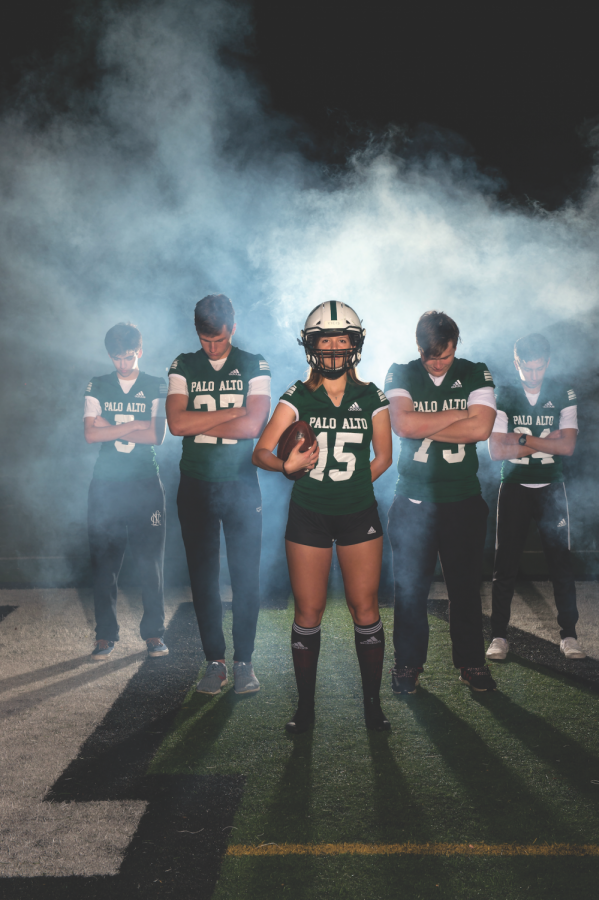

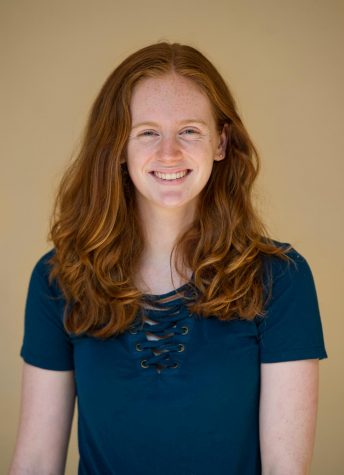
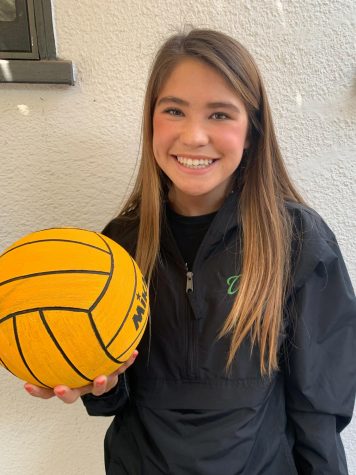

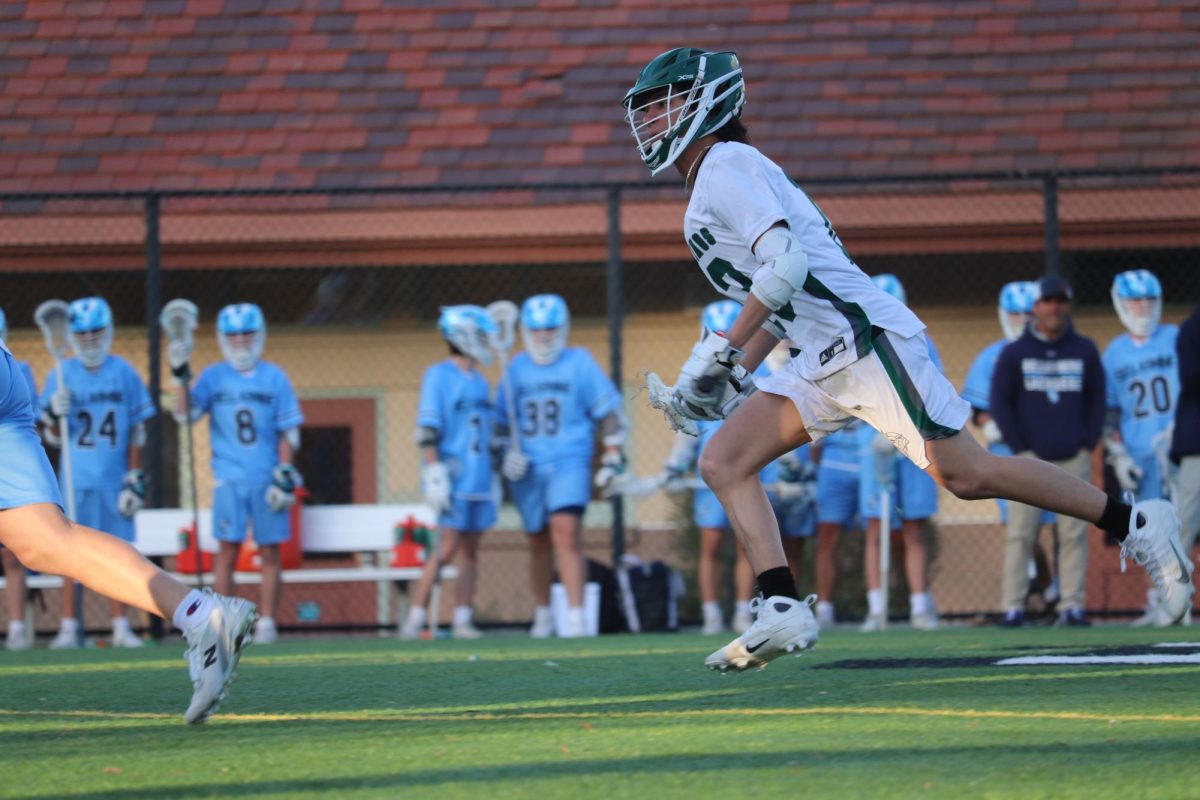


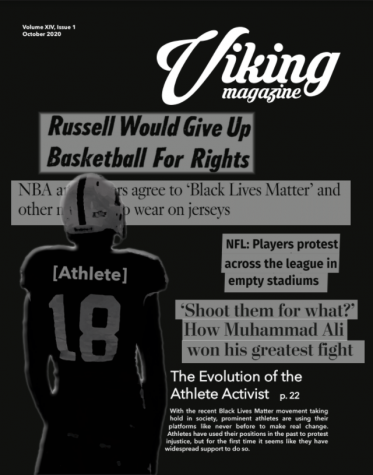
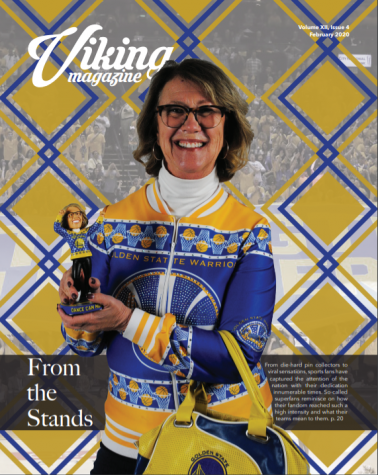
Chris Hallenbeck • Apr 11, 2020 at 10:16 am
I adore Syd and am proud of her accomplishment, but I thought Heather Hughes, class of ‘82ish played for Paly? I can’t recall though if it was JV or Varsity. – Chris Hallenbeck (‘86)